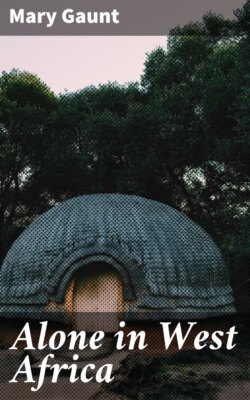Читать книгу Alone in West Africa - Mary Gaunt - Страница 22
На сайте Литреса книга снята с продажи.
Оглавление
My gear came on men's heads and the Consul's note was delivered to me in the bush. Neither he nor I understood why it had come by such a roundabout path. One of his servants also met us half-way with a lantern, and since I had heard by then about the “tigers” I confess to thinking it was a wise precaution.
The Consulate is a fine two-storied building with wide verandahs and a large hall where we generally sat, and that hall was very inadequately lighted by some excellent lamps. The Consul didn't understand them and the negro servants didn't understand them, and darkness was just visible and I determined as soon as I knew my host well enough to ask him to let me have a turn at his lamps. Such is the power of a little knowledge; when I left the Consulate it was lighted as it should be, but that first night we spent in a dim, religious light, and I felt I was going to enjoy myself hugely, for here at last was something new. The Gambia and Sierra Leone had been too much regulation Tropics; all that I had seen and done I had at least read of before, but this was something quite different. This had all the glamour of the unknown and the unexpected. I am bound to say that His Majesty's Consul did not look at things with the same eyes. He didn't like Liberia, and he said frankly that things might be unexpected in a measure but he always knew they would be unpleasant. But I went to bed that night with the feeling I was really entering into the land of romance.
Next morning I told my host I would go and see the town.
“But I shan't go by the short cut,” I added emphatically.
“What short cut?”
“The way we came last night.”
“That's not a short cut,” said he, and he smiled pitifully at my ignorance of what was before me. “That's the main road.”
And so it was. Afterwards I tried to photograph it, but in addition to the difficulty of getting an accurate picture of a steep slope, I had the misfortune to shake the camera, and so my most remarkable picture was spoiled. I give a picture of the road, but I always felt when I came to that part the worst was left behind. And yet on this road is the Liberian College where the youth of Liberia, male and female, are educated. It is a big building built of brick and corrugated iron, in a style that seems wholly unsuited to the Liberian climate, though viewed from a distance it looks imposing in its setting of greenery. They teach the children algebra and euclid, or profess to do so—evil-tongued rumour has it that the majority of the Liberian women can neither read nor write—but to attain that, to them a useless edge, they have to scramble over without exception the very worst road I have ever met.
But the road only matches the rest of the place. Monrovia is not only an ill-kept town, it is an outrageously ill-kept town.
